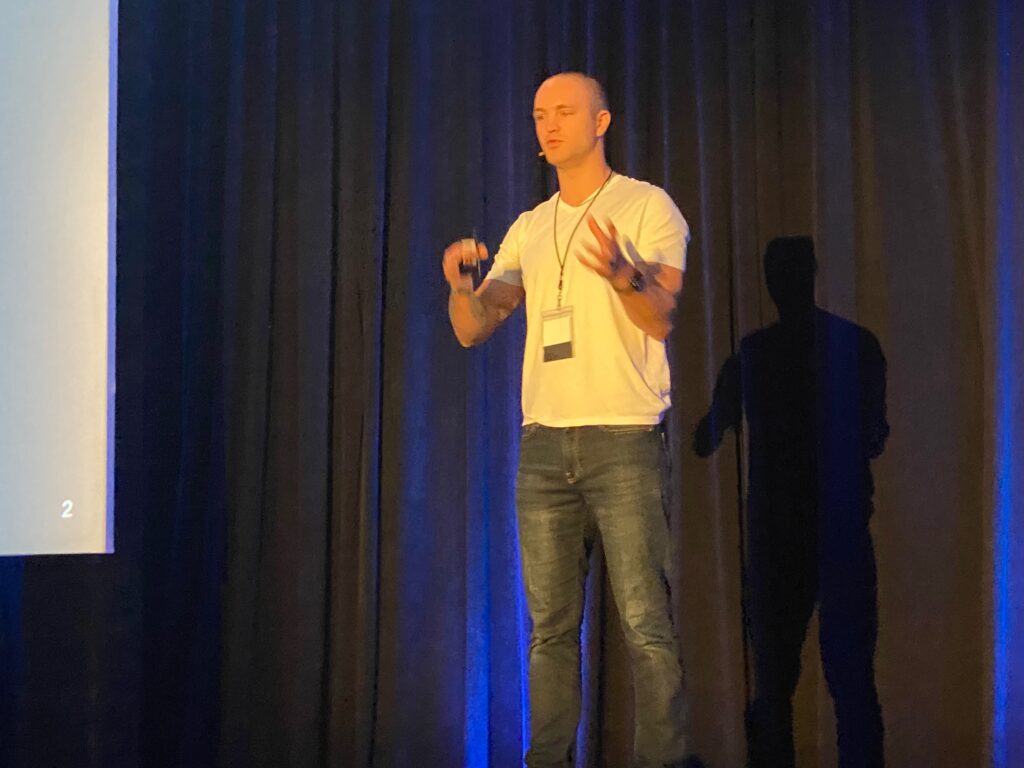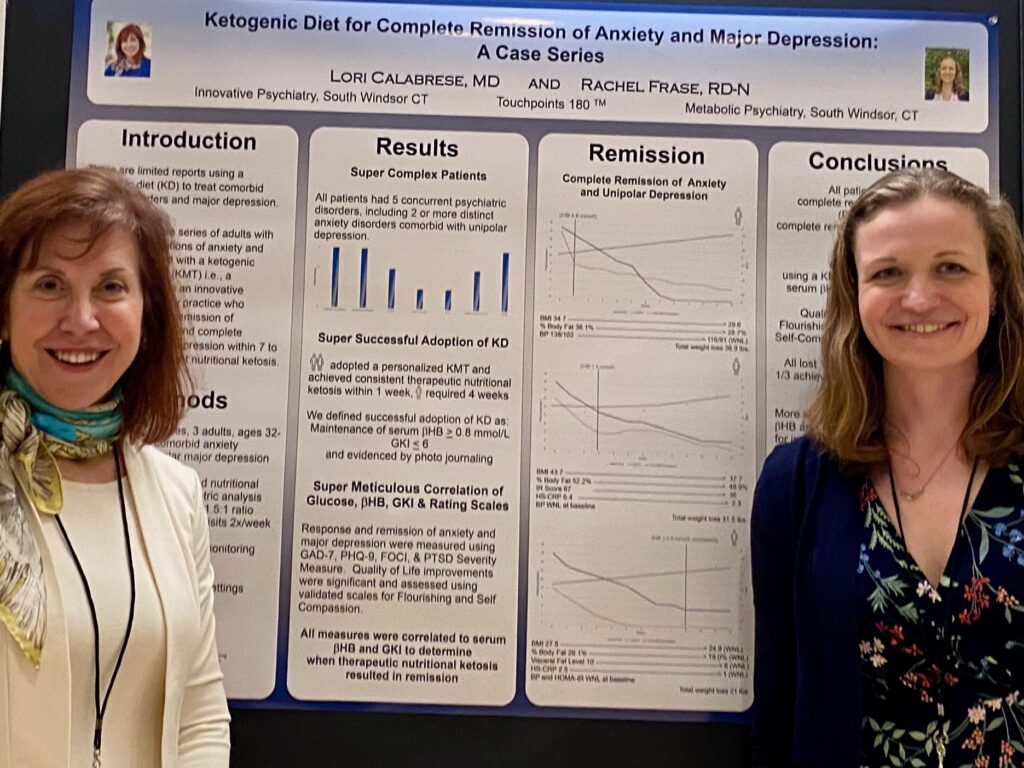
We’ve anticipated this world class Metabolic Health Summit 2024 for some time, and it’s finally happened!! Top scientific and clinical researchers and world-class experts on low carb, metabolic interventions, and ketogenic diet treatments gathered to share their research and outcomes. And we listened with rapt attention. Not a minute went by that wasn’t packed with new, exciting and applicable information. It’s all to help you, our patients, get better — and live healthier, happier lives. (Thank goodness there was coffee there!) And there were so many opportunities to create new collaborations and make new friends. You can see us above with Chef Ikaika Molina, who does Culinary Medicine in Hawaii. We’re so excited to see the growth in our field — and so many possibilities when we use food as medicine in treating our patients. (Shout out to Ikaika—stay in touch and let’s find a way to work together!) Now, about the astounding expertise of our speakers …

Valter Longo, Ph.D
Valter Longo, Ph.D., is Director of the USC Longevity Institute. Named one of Time Magazine’s 50 Most Influential People in Health Care. His research on fasting-mimicking diets (FMD) for the improvement of health and prevention of disease has been groundbreaking and his keynote address showed us how use of these FMD cycles to reduce tumor progression. He talked about how those who are undergoing extensive chemotherapy along with fasting-mimicking dieting, are showing greater results with remission.
He also works to identify the molecular pathways conserved from simple organisms to humans to find ways to modulate them to protect against multiple stresses. For example, to treat or prevent cancer, Alzheimer’s Disease and other diseases of aging. The focus is on the signal transduction pathways that regulate resistance to oxidative damage in yeast and mice.
He’s a true leader in our field.

Iain Campbell, Ph.D.
Iain Campbell, Ph.D., from the University of Edinburgh, is a Baszuki Research Fellow. He has personal, lived experience with bipolar 2 disorder and has seen dramatic and sustained benefits of KMT (ketogenic metabolic therapy), often just called KD (ketogenic diet) for over 7 years. He’s the principle investigator on a pilot trial exploring the use of a ketogenic diet for bipolar II disorder. He reports that all patients with bipolar disorder show a decrease in ketone levels, and low levels of lactic acid. Lactic acid is an indicator of mitochondrial dysfunction. These two significantly altered biomarkers show up in bipolar disorder. Lactic acid is one of the most important measured biomarkers.
It’s exciting to see metabolic measurements that tell us about a condition as serious as bipolar disorder. It also helps us understand why a ketogenic diet can bring this condition into remission. This Metabolic Health Summit brought out the best in the best.
The psychiatric outcomes that he says they saw as the participants adopted and maintained a ketogenic diet (with 91% adherence—amazing numbers!) were highly significant correlations in mood, anxiety, impulsivity, and energy. His team measured ketones every day and saw them moving every day. They looked at causation and correlation. And they saw a correlation of ketones to response, particularly in anxiety, as well as highly significant correlations in improved mood, energy and reduced impulsivity.
He just published his paper, The Metabolic Overdrive Hypothesis: Hyperglycolysis and Glutaminolysis in Bipolar Mania, this week in Molecular Psychiatry. (Hooray, Iain—what a win for it to come out just before the Summit began!) He explained that glutamate serves as a sort of metabolic fuel source, and suggested that perhaps when we’re producing ketones, glutamate decreases and this may partly explain the dramatic response we see in bipolar disorder. And there are multiple other mechanisms at play, as we know.
NPR published an article featuring Iain and his work, as well as many others in this field–a superb piece that’s worth reading.
Fascinating. Thrilling!!
We’ll want to keep reading more of his work going forward.

Matt Baszuki
And then we got to hear from Matt Baszucki from The Baszuki Group and Metabolic Mind, and who spoke from lived experience—a strikingly well-delivered, honest, funny, and heart-rending 5-year story of living with bipolar I disorder — all of it.
After many hospitalizations, over 40 mental health professionals, 29 medications, and so much pain, he found a way out. And as he did, he began to analyze his symptoms, and what seemed to make them worse.
Matt talked about how around March as the days become longer, many people with bipolar disorder become symptomatic. And, he realized mania struck him at this time around the Equinox…he called it March Madness. So, he would need to take extra medication at this time of year, and he learned to prepare himself, so he was ready when March came.
Finally, his mom helped him find ketogenic treatment and a psychiatrist and dietitian who could help him with it. That was in January of 2021. He was ready to try something that might actually work.
The ketogenic diet required a lifestyle change—a big one, full of good changes for his body, his sleep, his schedule, and his ability to really flourish, and to work. He was able to very slowly taper meds that he didn’t need anymore. And his symptoms subsided — but if he relaxed with his ketogenic diet, and ate more carbohydrates, his symptoms would start up. So he’d become strict again (his words).
It changed his life. It changed his family’s life.
He offers a compelling message about the freedom in ketogenic living. And the importance of the healthy lifestyle changes he’s made sleep, exercise, meditation and meaningful work — in order to get and stay well. It is about freedom. And it’s about hope.
What a joy to hear his story!

Christopher Palmer, M.D.
Chris Palmer, M.D., who wrote Brain Energy, digs deep. He opened with how 20-60% of patients with psychiatric disorders suffer from treatment resistance. And most psychiatric treatments are not curative… they aren’t disease-modifying therapies, they just reduce symptoms… at best. He said that psychiatry is a mess because the field doesn’t really understand what mental illness is.
He points out that a recent 2023 study by Brandt et al., suggested that there’s a general disease factor playing a role in mental and physical illness.
Dr. Palmer agrees, in that mental disorders are metabolic disorders of the brain. He made the point that all of the risk factors for mental illness are all of the risk factors that adversely impact metabolism.
The unifying brain energy theory that he proposed in Brain Energy is this: Metabolic dysfunction in cells can explain all aspects of mental illness.
How ’s that for a breakthrough concept?
He wants us to come away with this: metabolic treatment using individualized, psychiatrist and dietitian-supervised ketogenic approaches can be disease-modifying therapies. They can change your present… and they can change your future.
We know this, and we see this every day in our patients.
He suggests we need to think about mental states and mental disorders in the same way that we think about pain. Pain is perfectly normal; all of us have it. It’s not a disorder, it’s not the body malfunctioning. We might take a pill for it, we might need some help, we might want some comfort. You can have extreme pain if you get surgery; you might have extreme and prolonged pain for clear reasons, but these are not disorders of pain. However, there are, in fact, pain disorders in which the pain system is malfunctioning, and where the brain regions are malfunctioning — and produce the sensation of pain when a person should not be having pain.
He argues that mental states operate in the same way: Anxiety is normal, extreme anxiety is normal (if you’re being bullied, for example) — and yet there are people who experience anxiety for no reason, because the brain regions that code for anxiety are firing, although they shouldn’t or don’t need to be firing.
Mental Illness and Metabolic Conditions
Mental illness is strongly correlated with obesity, diabetes, cardiovascular disease and decreased life expectancy, and all of these are strongly correlated with higher rates of psychiatric disorders.
When we see strong bidirectional correlations, we need to consider a common pathology: mitochondrial dysfunction. Mitochondria—the organelles in each cell create energy. In the brain, they create brain energy.
His words were pure gold. This was one of the best talks — and there were so many! — at MHS 2024, a true Metabolic Health Summit that pulled together incredible scientific researchers and clinicians from all parts of the world, and from bench to patient care addressing the most challenging issues for human health.

Jocelyn Tan, M.D.
Jocelyn Tan, M.D., is Integrative Oncology Director at the VA Pittsburgh Healthcare System on ketogenic diet therapy for oncology. She said research for this began in 1913, with a fascinating study of lab rats. One group was fed bread, and the other was fed a form of protein and lard. Then, they were injected with cancer cells. All the rats got cancer, but in the ones eating bread, the tumors grew. In the ones eating lard, the tumors were small.
More experiments followed, and in all cases, the rats fed a form of sugar nearly all died. Of the rats who were fed lard, only 6 out of 26 died — and they didn’t die of cancer.
Pretty remarkable, and in 1913 no less!
Dr. Tan described her feasibility study evaluating the ketogenic diet in endometrial cancer patients. They collected tissues before the diet, then after the diet, and did tissue studies to understand what happens to the tumor during the diet. Then, the exosome analysis to understand why some patients have resistance and others respond to the treatment.
I could go on and on. Each speaker at this Metabolic Health Summit described outstanding, cutting edge, breakthrough research and treatments. There were so many outstanding experts.

Peter Crawford, M.D., Ph.D.
Peter Crawford, M.D., Ph.D., from University of Minnesota, Protective Interorgan, Intercellular, and Intercompartmental Metabolite Shuttles in Obesity described studies conducted to identify metabolic signals that distinguish lean or overweight athletically trained people that indicate latent markers of metabolic dysfunction…who are clinically healthy.

Bret Goodpastor, Ph.D
Bret Goodpastor, Ph.D., Scientific Director and a Senior Investigator at the AdventHealth Translational Research Institute. He researches the pathophysiology of obesity, insulin resistance, and diabetes. He talked about how both exercise and weight loss improve insulin sensitivity. So his team then became more interested in this: when you combine calorie restriction with weight loss, is there an additive effect?

Andrew Koutnik, Ph.D.
Andrew Koutnik, Ph.D., Research Scientist at the Sansum Diabetes Research Institute, spoke on Nutrition and Cardiometabolic Health in Diabetes. This subject is near and dear to his heart because he has Type 1 diabetes himself. He’s currently investigating the impact of divergent nutritional interventions on cardio-metabolic health in Type 1 diabetes, pre-diabetes, Type 2 diabetes, and obesity. He points out that if you’re diagnosed with any one of these diseases, your life expectancy is reduced by about 10 years.
He says there is too little research on diet for Type 1 diabetics, and describes studies of Type 1 diabetics involving diets with carbohydrates, and those that are low carb. They learned that blood glucose control was more difficult with when the traditional carbohydrates were included in their diets. That in spite of the extensive research on diabetes and the technology benefits for glucose control, Type 1 diabetics still have insulin resistance and dysfunction in blood glucose levels. They found that when lower amounts of carbohydrate are included in the diet, there is improved control of blood glucose.

Franziska Spritzler, RD-N, C.D.E.
Franziska Spritzler, R.D-N., C.D.E., presented a beautiful and practical approach to implementing ketogenic and LowCarb diets. Franziska explained how to determine protein needs, as well as how to determine the carbohydrate needs for a customized diet in certain conditions. She talked about optimal levels of ketosis, and talked about using ketogenic and LowCarb diets for Type 2 diabetics, stressing there is lots of evidence to support this approach. She also talked about these diet interventions for polycystic ovary syndrome (PCOS).

Ben Bikman, Ph.D.
Ben Bikman, Ph.D., scientist and professor at Brigham Young University, seeks to better understand the role of elevated insulin and nutrient metabolism in regulating obesity, diabetes, and dementia.
Isn’t it great there is so much work being done in this area?
Dr. Bikman talked about the pathophysiology of fat cells, and how they grow and become suffocated as they get farther and farther from capillaries. He’s the fat cell expert, for sure! He knows the drilled-down details of how they grow, how they proliferate, and how this leads to so many end-problems in our bodies and for our overall health. He talked about obesity in America compared to insulin resistance in India, and how weight gain in diabetics is related to their insulin intake.

Richard Johnson, M.D.
Richard Johnson, M.D., Professor of Medicine at University of Colorado, is internationally recognized for his work on sugar and how it plays a role in obesity and diabetes. So delighted to hear him speak. Dr. Johnson has published over 500 papers, and is the author of the book, Nature Wants Us to be Fat.
He says Metabolic Syndrome is the great precursor—not just to diabetes and cardiovascular disease. There are now newer associations with conditions like Alzheimer’s disease. Also vascular dementia, ADHD, bipolar disorder, depression, cancer, preeclampsia, polycystic ovarian syndrome.
Who knew these were metabolic diseases… until we learned how pervasive metabolic illness really was?
He talked about fructose — a sugar found in fruit — playing a huge primary role in increasing fat.
(Wait—but you’ve no doubt been taught that fruit should be included when you try to lose weight, right?)
But fructose is used in nature to store fat. Bears eat copious amounts of fruit before they hibernate. Fructose drives hunger, thirst, and foraging. Fructose decreases the resting metabolism (to increase fat stores).
It causes insulin resistance and decreases glucose delivery to the muscle. It causes inflammation (which was probably meant to protect us from infection); it maintains circulation and glomerular (in the kidneys) circulation. Fructose also switches on glycolysis to protect animals in a low oxygen state.
His talk was fascinating and eye opening.

Tommy Woods, M.D., Ph.D.
Tommy Woods, M.D., Ph.D., Director of the Neonatal Neuroscience Lab, Food and the Brain Dementia Prevention Database gave a wonderful talk on age-related cognitive decline. He says that age-related cognitive decline is often overcomplicated. He says that a conservative estimate of 40% of cognitive decline is preventable. With improved diet with improved nutrients, rest, and late life social and cognitive activity while reducing stress, there is potential for marked improvement in cognitive acuity. Breakthrough concept for the Metabolic Health Summit.

David Feldman, UCLA
David Feldman, UCLA, software engineer, entrepreneur, and founder of Citizens Science Foundation, researches why LDL rises on some people on a LowCarb diet and asks if this rise results in heart disease. He’s doing a study that began in February of 2023, and will continue next month in February 2024, on lean mass hyper responders (LMHR) to understand why some people have elevated LDL and if this is actually correlated with an increase in coronary artery plaque. Absolutely tremendous work, which may finally up-end conventional thinking in medicine.

Nick Norwitz, PhD, (right) who describes himself as “Dave’s brother by another mother” has been captivated by this work and conducted an N of 1 experiment on himself (he’s a lean mass hyper-responder on a ketogenic diet) by eating a sleeve of Oreo cookies every day followed by 6 weeks of high intensity statin therapy. The Oreos reduced his LDL by 71% — twice as much as the statin did.
In LMHR, we think that the high LDL is triggered by lowering carbs, so his hypothesis is if you add back carbs, it should lower your LDL. He added back carbs by eating an entire sleeve of Oreos every day, and it certainly did lower his LDL. You can find this all over YouTube (but realize that his experiment was to prove a point, not to promote or suggest that anybody eat cookies, sugar or processed foods).
Nick is a one-man riot—fearless, funny and absolutely brilliant. I crown him the King of Disruption—the guy knows how to get people to sit up and pay attention. So glad he was at Metabolic Health Summit 2024.

Lily Nichols, RDN, CDN
Lily Nichols, RDN, CDN, is the founder of the Institute for Prenatal Nutrition, and co-founder of Women’s Health Nutrition Academy. She gave an outstanding talk on how metabolic health starts in utero. She stressed the importance of real food for pregnancy and for gestational diabetes.
Her work has helped change international guidelines on nutrition in pregnancy. Diabetologists in the Czech Republic used to have national guidelines that set a minimum carb intake of 200g per day for prenatal women, and after they reversed it to be a maximum of 200g, they’ve reported better maternal and fetal outcomes, less excessive birth weight, and less gestational diabetes. She trains professionals in the Institute for Prenatal Nutrition.
A baby inherits the expression of parents’ genes at conception, and their mitochondria from their mothers (not their fathers). Plus, your genes are further impacted by the environment in utero, and the first two years of life. So, a mother’s nutrients are vital from before conception. This is essential information for us to hear at Metabolic Health Summit 2024.
And Our Poster Presentation


Rachel Frase, RD-N, our expert ketogenic registered dietitian-nutritionist, and I presented this poster of our work showing complete remission of generalized anxiety and major depression with Touchpoints 180™ and we were so happy to see how enthusiastically it was received. (The international scientific poster session at MHS 2024, Metabolic Health Summit 2024, was sponsored by Keto-Mojo, and was pretty packed.)
As we move forward in our Metabolic Psychiatry practice, we look forward to helping you experience the benefits of therapeutic nutritional ketosis and the metabolic health that goes with it. We’ve learned so much this week at Metabolic Health Summit 2024 — and we’re eager to bring it to you.
If you’re struggling with depression, anxiety, bipolar disorder, weight and metabolism, and other conditions we’ve talked about, call us.
Our Touchpoints 180™ program can help you find vibrant, balanced health and joy again.

To the restoration of your best self,

Thanks for this wonderful summary of the Summit ! Very Interesting and Informative.